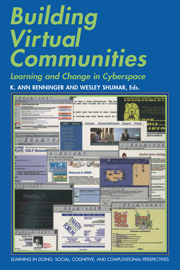Book contents
- Frontmatter
- Contents
- List of Tables and Figures
- Contributors
- Series Foreword
- Preface and Acknowledgments
- Foreword: Virtual Communities for Learning and Development – A Look to the Past and Some Glimpses into the Future
- Building Virtual Communities
- Introduction: On Conceptualizing Community
- Part One Types of Community
- Part Two Structures and Community
- Part Three Possibilities for Community
- Afterword: Building Our Knowledge of Virtual Community: Some Responses
- Afterword: Building, Buying, or Being There: Imagining Online Community
- Index
- References
Preface and Acknowledgments
Published online by Cambridge University Press: 12 November 2009
- Frontmatter
- Contents
- List of Tables and Figures
- Contributors
- Series Foreword
- Preface and Acknowledgments
- Foreword: Virtual Communities for Learning and Development – A Look to the Past and Some Glimpses into the Future
- Building Virtual Communities
- Introduction: On Conceptualizing Community
- Part One Types of Community
- Part Two Structures and Community
- Part Three Possibilities for Community
- Afterword: Building Our Knowledge of Virtual Community: Some Responses
- Afterword: Building, Buying, or Being There: Imagining Online Community
- Index
- References
Summary
This volume is unique in its focus on the learning and change that takes place in the building of communities in cyberspace. Knowledge and resources for knowledge building are central to both virtual and physical communities. Members, or participants, in any community are engaged in learning that is critical to the survival and reproduction of that community. This learning may be even more true for virtual communities than it is for physical communities. For those concerned with building virtual communities and those who are working to understand the impact of virtual communities on participants, clarity about the nature of learning and change that is enabled by the Internet is of particular importance.
At first glance, identifying the nature of learning and change that takes place as a virtual community builds out may seem a straightforwardenough proposition. A dearth of literature has supported the importance of community to learners of all ages (Barab & Duffy, 2000; Bellah et al., 1985; Bransford, Brown & Cocking, 1999; Brown & Campione, 1994; Lave, 1993; Wellman & Gulia, 1999; Wenger, 1999). Through community participation, learners find and acquire models and have the opportunity themselves to be models and apprentices. In community participation, activities such as asking questions and providing the person with whom one is talking with background information are both supported and socialized.
- Type
- Chapter
- Information
- Building Virtual CommunitiesLearning and Change in Cyberspace, pp. xvii - xxPublisher: Cambridge University PressPrint publication year: 2002



